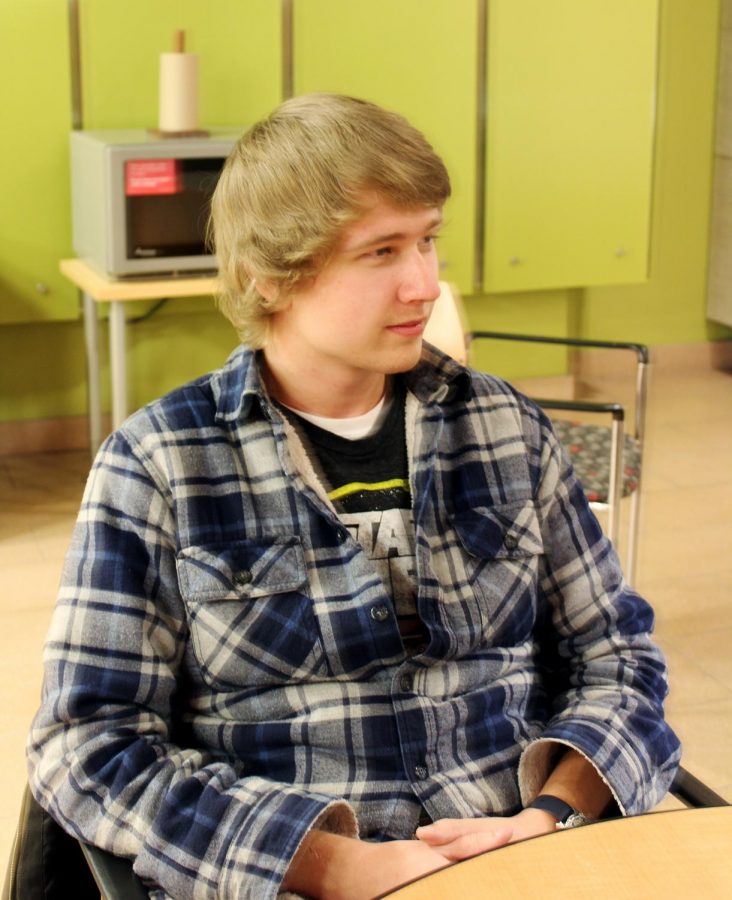First-generation student credits involvement in success
Support services, clubs prepares Svensson for engineering career
ABBY TUTOR | The Daily Evergreen
Alex Svensson talks about his experience as a first generation student.
December 4, 2017
Watching his dad fix up his old MGB roadster as a child inspired senior Alex Svensson to pursue automotive engineering as a career. There was only one problem, his parents didn’t go to college, so he had to figure things out on his own as a first-generation student.
In the nation, 89 percent of low-income, first-generation students leave college within six years without a degree with one-quarter of those students leaving within the first year, according to the National Center of Education Statistics.
WSU first-generation students, who make up about 37 percent of incoming freshmen, have bettered the statistics with a 77 percent first-year retention rate. Additionally, the rate increases to 94 percent when a student is involved in a first-generation program.
With the hardships of being a first-generation student came an opportunity for Svensson, joining First Scholars, a four-year program designed to help first generation students succeed throughout college and after.
Svensson said though he had scholarships that covered his tuition, he struggled to cover housing and dining costs. When first accepted into the program, he said he was constantly in and out of the program’s office figuring out loans.
“They always put us in the right direction,” he said.
He said the program helps with studying, getting involved and creating a network. All the students in the program live in the same dorm their freshman year and are required to complete a certain amount of study hours depending on their grades. They also are required have a cumulative 3.0 GPA, work in service projects and join a club their freshman year.
At first, Svensson didn’t know which club to join. However, when he was working as an assistant hall director, he watched documentaries about the development of racing technology which helped him consider pursuing a career in automotive engineering.
Svensson hesitantly joined a robotics club in high school where he first gained interest in mechanical engineering, leading the club his junior and senior year.
He decided to continue the engineering route by joining RC Baja at WSU, where his team engineered a radio-controlled car that competed against University of Idaho.
“If I wasn’t pushed to join a club,” he said. “I probably wouldn’t have and wouldn’t have met these amazing people I made connections with.”
He later joined the largest engineering club on campus, Formula SAE, where he now serves as the power training lead engineer and safety officer, putting axles in race cars and competing against 120 schools from around the world.
Formula SAE club President Kevin Basler said he could always count on Svensson when they needed him and sets high standards for himself as a very hardworking, organized and committed guy.
Basler, whose parents both went to college, said though Svensson has struggles similar to many college students, he seeks out advice primarily from his peers.
“It’s easier for me, knowing I have parents who value success in academics,” Basler said. “[Svensson] has no one to fall back on.”
His older brother, Daniel Svensson, also decided to pursue a similar career path, but a few years later. An avid guitar player, he thought about pursuing music in high school, but wasn’t sure. He then bought a car to fix up with his dad and thought about pursuing a career as an automotive technician, which he now studies.
Daniel said he as well as his brother Alex Svensson were both determined and hardworking growing up. Both have now turned their focus toward their respective careers.
Even though Alex Svensson said his dad inspired them to pursue a career involving cars, he said they couldn’t help them figure out college since they hadn’t gone themselves.
“It was up to us to figure things out,” he said.
Svensson has also served as an RA and assistant hall director, positions he said he would have never have obtained without the connections he made in First Scholars.
Svensson who now recruits for the program said when he graduates, he ideally wants to go into automotive engineering but also is open to marine or aerospace engineering due to its prevalence with companies like Boeing in Seattle.
“I was encouraged to push my limits,” he said. “I’d never thought I’d get this far.”









